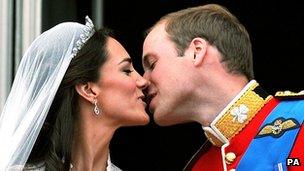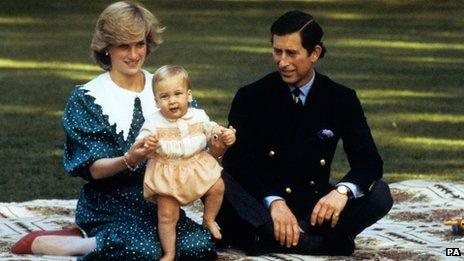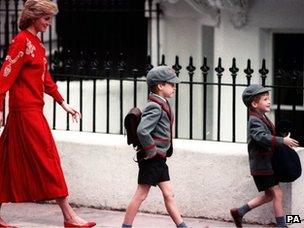Royal baby: What does the future hold for the Cambridge prince?
- Published

The Duke and Duchess of Cambridge's first child has been born
It is an event which in recent times has only occurred once every 30 years or so, the birth of a child in direct line to the British throne.
There was Prince Charles in 1948; William in 1982, and now a so-far unnamed prince in 2013.
The birth of any baby is a moment which invites those around it to reflect, on their own lives and on the prospects for the life which has just begun.
In one sense, the future for baby Cambridge is already infinitely more mapped out than that of just about any other newborn child.
Barring revolution in Britain, the shape and trajectory of his life is, in every real sense, inescapable.
This is a child whose destiny is to inherit one of the oldest hereditary thrones in the world.
It will be a life which will be shielded from many of the pressures and frustrations that are everyday occurrences for the rest of us.
But the position brings its own, at times intense, challenges.
Wider world
When so much is handed to you on a plate, any royal with any intellectual sensibilities - and that has not, it must be said, always included all of them - can be susceptible to debilitating self-doubt.
They have achieved a position at the apex of society in which they are surrounded by high-achievers of every sort, without ever having had to prove that they are worthy of such preferment.
It is perhaps the thing about a hereditary system that the meritocrats and republicans despise most of all.

Prince William was the last baby born in direct line to the British throne
Hence the importance - recognised by those around William and Harry - of giving young royals the opportunity to test themselves in the wider world and discover a sense of self-worth rooted in achievement rather than arrogant assumption.
The princes have done it through their military service - William as an RAF search and rescue pilot, and Harry through his deployments with the Army to Afghanistan.
In due course the same principles will need to be applied to the life of the Royal Family's newest member.
That baby Cambridge is "special" is something most people would acknowledge.
But in the world in which he will grow up it would surely be a mistake for him to believe that special automatically means "better".
As baby Cambridge's life progresses, he will need to do what his father, grandfather and great-grandmother have all attempted to do - that is to earn respect by the manner in which they have set about their respective roles.
Unsurprisingly, perhaps the best template to follow would be that of his great grandmother, who has brought both commitment and a sense of humility to her role as monarch.
All of this is for the future. However, one challenge that is likely to dawn on baby Cambridge at a comparatively early age is that he faces a lifetime of public scrutiny.
-
 Baby Cambridge leaves hospital
03.36
Baby Cambridge leaves hospital
03.36
-
 Gun salutes mark royal birth
01.40
Gun salutes mark royal birth
01.40
-
 Guardsmen play 'Congratulations'
02.39
Guardsmen play 'Congratulations'
02.39
-
 Was baby coverage over the top?
02.39
Was baby coverage over the top?
02.39
-
 Charles and Camilla visit royal baby
01.08
Charles and Camilla visit royal baby
01.08
-
 Middletons visit 'beautiful' grandson
01.44
Middletons visit 'beautiful' grandson
01.44
-
 How a baby helps rebrand royals
02.44
How a baby helps rebrand royals
02.44
-
 Watching the royal baby-watchers
00.48
Watching the royal baby-watchers
00.48
-
 Bucklebury pupils offer baby names
01.35
Bucklebury pupils offer baby names
01.35
-
 Message from RAF colleagues
02.48
Message from RAF colleagues
02.48
-
 Palace life for a royal prince
00.45
Palace life for a royal prince
00.45
-
 Bulletin displayed at palace
01.52
Bulletin displayed at palace
01.52
-
 London turns blue for royal baby
00.44
London turns blue for royal baby
00.44
-
 How the news was broken worldwide
01.00
How the news was broken worldwide
01.00
-
 2,013 coins to mark royal birth
01.19
2,013 coins to mark royal birth
01.19
-
 Town crier announces birth
01.00
Town crier announces birth
01.00
William is aware from his own childhood of just how intrusive and upsetting that can be.
It will be an absolute priority for him to try to ensure that his son enjoys a childhood as undisturbed as possible from an international news media who regard the younger British royals with the hard-headed commercial glee of business executives who have discovered a super-magnet for ratings and readers.
Catherine too knows a thing or two about dealing with the unquenchable curiosity of the media.
She will be equally as determined to surround her first-born child with as much "normality" as possible.
To that end she has the considerable advantage of a close and resourceful family of her own.
The Middletons have shown both single-minded determination in achieving their own family goals, and - by and large - an impressive discretion at finding themselves in such proximity to the Queen and her family. The one lingering question mark against that point remains Catherine's younger sister Pippa - but that is another, continuing story.
Loving environment
Much has been written already about how baby Cambridge will be the first front-rank British royal to be brought up imbued with the middle-class, Home Counties values of the kind that Kate herself seems to embody.
If that is the case, who can seriously argue that a Middleton-inspired dose of grounded self-discipline will not be beneficial for a young royal born to the pinnacle of privilege.
Kate's mother Carole will be the child's only grandmother and it seems reasonable to suppose that her influence will be significant, particularly given the closeness of her relationship with her elder daughter.

Baby Cambridge can expect a lifetime of public curiosity - and maybe a younger sibling
So baby Cambridge can expect to have a secure and loving environment in which to grow up and begin to understand what is expected of him.
At some point there may well be a younger sibling - but perhaps just the one, as the Royal Family appear to have understood the problems of producing too many young royals, all of whom require a role.
So what does the future hold for baby Cambridge?
In short, a lifetime of public curiosity and, in due course, the responsibility of refreshing and taking forward the ancient institution that is the world's best-known hereditary monarchy.
Much as it will set republican teeth grinding, there would seem to be every likelihood that in approximately 50 years from now the baby whose life has just begun will ride to Westminster Abbey in a golden coach to be crowned monarch in a line which can be traced back more than a thousand years to good King Egbert of Wessex.
So, with that thought baby Cambridge, welcome and - without sacrificing the objectivity that is expected of every BBC correspondent - good luck!
- Published22 July 2013